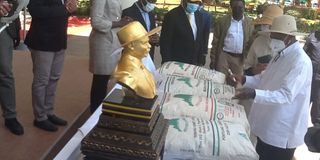Prime
Manufacturers, traders cry foul over imported cement

President Museveni signs on one of the cement bags during the commissioning of new Tororo Cement Vertical Milling Plant in Tororo District in September. Photo/Joseph Omollo
What you need to know:
They fault the rampant cement smuggling to weak enforcement systems, saying the smugglers use even the gazetted borders where they pay some money to the enforcement officers and cross easily.
Leaders on the Uganda-Kenya border are facing a challenge of combating the clandestine trade of cement smuggling from Kenya that has left Ugandan manufactures and traders counting losses.
An investigation by this publication reveals that tonnes of cheap illegal cement is being smuggled into the country through the porous border points, especially along Lwakhakha, Busia and Malaba.
This involves both large scale and small scale traders who use smaller vehicles to carry cement through uncontrolled border points and the most common brand smuggled is Simba Cement.
Mr Ambassador Okolong, who owns a hardware shop on Park View Lane in Tororo Town, yesterday said the flooding of Kenyan cement into the market has affected them as dealers in Ugandan cement.
He added that Simba Cement is sold at Shs20,000 while Ugandan cement of the same type is sold at Shs29,000.
“Due to the depreciating Kenyan shilling, most people have resorted to crossing to Kenya and buying it directly from the hardware shops and smuggling it to the Ugandan side,” he said.
The three-week investigations by this publication indicate that the cement smugglers are making billions of shillings at the expense of Ugandan cement traders.
Uganda Revenue Authority enforcement officers said the government is also losing revenue since the body mints Shs2,000 per 50kg bag of cement that gets into the country.
“As enforcement agencies, we have tried to strengthen our efforts but we are constrained because of limited manpower,” a source that preferred anonymity at URA checkpoint in Malaba said during an interview on Saturday.
The Uganda-Kenya border stretches more than 800 kilometres, presenting a vast expanse that is difficult to monitor effectively. Smugglers exploit this vastness, taking advantage of porous border areas, informal crossing points, and remote regions to carry out their activities.
Mr Amos Mafabi, a businessman at Lwakhakha Town Council in Namisindwa District, said the number of bags smuggled during each trip depends on the size of the vehicle or other means used in transportation.
“A bicycle can carry three 50kg bags while a motorcycle can carry five bags. Vans carry as many as they can depending on capacity,” he says.
Mr James Opolot, who runs a hardware retail shop in Malaba, said if no intervention is sought, they will be forced out of business.
“Currently, the cement from Kenya is being ferried directly to the construction sites, leaving us without customers, especially in the porous points in Buteba Sub-county in Busia District,” he said.
He added: “We have been left with those customers who know the risks associated with smuggling. Otherwise, we would be out of business already. Initially on good days, I would sell at least 200 bags of cement but currently I hardly sell even 10 bags.”
Ms Christine Idalany, another hardware retailer, who had a cement business, said she was forced out after recording a decline in sales.
However, Ms Sylvia Kirabo, the senior communication officer at Uganda National Bureau of Standards, said they are liaising with URA to fight the vice at the border points.




